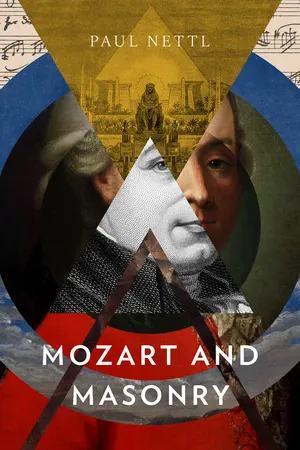
- 149 pages
- English
- ePUB (mobile friendly)
- Available on iOS & Android
Mozart and Masonry
About this book
A noted musicologist looks at the eighteenth-century composer's connection to Freemasonry and its profound influence on his music.
Speculative masonry was a pervasive intellectual force in eighteenth-century European society. Like many of his colleagues, as well as his father before him, Wolfgang Amadeus Mozart joined a Masonic lodge in 1784. The philosophy and symbolism of the Masons would be a major source of inspiration for his compositions from then on.
This book provides an overview of Mozart's relationship to the fraternity and a detailed account of the numerous pieces he wrote specifically for Lodge events or ritual, as well as the many pieces adapted by others for Lodge use. It also includes an in-depth explanation of Mozart's opera "The Magic Flute" and its Masonic themes and imagery.
Frequently asked questions
- Essential is ideal for learners and professionals who enjoy exploring a wide range of subjects. Access the Essential Library with 800,000+ trusted titles and best-sellers across business, personal growth, and the humanities. Includes unlimited reading time and Standard Read Aloud voice.
- Complete: Perfect for advanced learners and researchers needing full, unrestricted access. Unlock 1.4M+ books across hundreds of subjects, including academic and specialized titles. The Complete Plan also includes advanced features like Premium Read Aloud and Research Assistant.
Please note we cannot support devices running on iOS 13 and Android 7 or earlier. Learn more about using the app.
Information
Table of contents
- Cover
- Title Page
- CONTENTS
- INTRODUCTION
- MOZART AND THE CRAFT
- A MASONIC ALBUM FROM MOZART’S DAY
- MASONIC MUSIC BEFORE MOZART
- MASONIC MUSICIANS AROUND MOZART
- MOZART’S MASONIC COMPOSITIONS
- THE MAGIC FLUTE: BACKGROUND
- THE MAGIC FLUTE: WORDS AND MUSIC
- THE MAGIC FLUTE: SEQUELS
- MOZART’S LIFE
- MOZART THE MAN
- MASONIC MUSIC AFTER MOZART
- FOOTNOTES
- NOTES
- INDEX
- Copyright